Three Oxford academics awarded European Research Council Consolidator Grants
Thursday 23rd Nov 2023, 10.42am
The application process for ERC Starting Grants is highly competitive: this year, around 14.5% of applications were successful out of a total of 2130 submitted proposals. ERC Consolidator Grants are awarded up to €2 million for a period of 5 years.
About the Oxford recipients:
 Associate Professor Fabrizio Caola
Associate Professor Fabrizio CaolaFabrizio Caola is Associate Professor of Theoretical Particle Physics in the Department of Physics. His ERC research project aims to develop a new generation of theoretical predictions for the Large Hadron Collider (LHC) to unlock new insights from its data.
The LHC at CERN is producing incredibly precise data, which allow us to study the structure of the fundamental interactions that govern our universe in a regime never explored before. About ten years ago, the LHC already achieved its first milestone by discovering the Higgs boson, a key missing piece of the Standard Model of particle theory. More recently, LHC data demonstrated that the Higgs boson seems indeed to interact with matter through Yukawa interactions, a phenomenon not observed at the fundamental level previously.
I am really honoured to have been awarded an ERC consolidator grant, which will allow me to assemble a team of top scientists from all over the world to tackle some of the most pressing problems of collider phenomenology. I am particularly grateful to my friends and colleagues in Oxford who helped me to sharpen the research vision and communicate it in a clear and effective way.
Associate Professor Fabrizio Caola, Department of Physics.
‘Further investigating the properties of the Higgs boson, as well as stress-testing the structure of the Standard Model and searching for possible signs of new physics are fascinating topics that will keep particle physicists engaged for a very long time’ says Dr Caola. ‘This will require extremely sophisticated theoretical predictions based on quantum field theory, a beautiful framework that combines quantum mechanics and special relativity.’
Dr Caola and his team will develop innovative techniques for calculating scattering amplitudes and new ways for dealing with the intricate patterns of particle radiation which currently prevent accurate theoretical predictions for all but a handful of very simple collider processes.
Aleks Kissinger is Associate Professor of Quantum Computing in the Department of Computer Science. His ERC project will address practical challenges in developing and verifying software for quantum computers.
 Associate Professor Aleks Kissinger.
Associate Professor Aleks Kissinger.Quantum computers offer immense potential for solving challenges currently beyond the reach of classical computers, including problems in chemical development, materials science, drug discovery, finance, and industrial optimisation. This is thanks to their properties of superposition (where quantum bits can exist in multiple states simultaneously, rather than being only off or on) and entanglement (where the state of one quantum bit influences another no matter how far apart they are). But quantum algorithms and software are currently in their infancy, and new programming techniques are needed before these capabilities can be utilised.
It is an amazing honour to be offered this grant. I would like to thank my students and collaborators who have made so much of the work building up to this possible, and I look forward to building one of the largest groups in Europe addressing practical challenges in developing software for quantum computers.
Associate Professor Aleks Kissinger, Department of Computer Science.
‘It is becoming increasingly possible to access and experiment with real, small-scale quantum hardware, but it is clear that the challenges involved in designing quantum software are much broader than just the discovery of new algorithms’ says Dr Kissinger. ‘Our research programme will address three major fundamental challenges: to develop better quantum compilers for translating high-level algorithms to real hardware; to simulate more complex quantum computations with classical computers; and to automatically verify the exact or approximate correctness of quantum computations.’
This work will be based on a mathematical method called the ZX calculus, which represents quantum computations as graphs that can be transformed and simplified using a handful of basic rules.
Anders Kock is Professor of Economics in the Department of Economics. His ERC research project aims to develop more powerful tests to identify true signals in large-scale datasets.
 Professor Anders Kock
Professor Anders Kock‘A major feature of modern data is that they record thousands or sometimes millions of characteristics for each object or individual. Although the availability of such granular data is a blessing, it also makes it extremely challenging to distinguish genuine signals from random noise’ says Professor Kock.
‘The goal of my ERC project is to develop new statistical tests that are provably more powerful than the state-of-the-art in a wide range of empirically relevant high-dimensional testing problems. This will allow researchers to find genuine effects that are missed by currently available tests.’
I am very pleased to have received the ERC Consolidator Grant. This will allow me to focus on a research project that I am passionate about for the next five years. I also look forward to building a group around this topic and to engage actively in disseminating the tools to be developed.
Professor Anders Kock, Department of Economics
Such tests could have a wide variety of applications, including testing whether a treatment has an effect on one of many groups of individuals, or one of many outcome variables of interest. ‘Currently employed tests are often constructed to detect either “sparse” or “dense” deviation from the null’ adds Professor Kock. ‘However, these are merely two conceptually useful extremes on a whole continuum of structures that deviations may have – a spectrum of semi-sparse deviations reside between these two endpoints. In light of this, I am interested in constructing tests that are consistent against a larger range of structures that deviations from the null can have.’
Further information about the 2023 recipients of ERC Consolidator Grants can be found on the ERC website.
ERC Consolidator Grants are part of the EU’s Horizon Europe programme. The UK agreed a deal to associate to Horizon Europe on 7 September 2023, which will apply from 1 January 2024. This means that UK recipients of 2023 ERC Consolidator Grants will be funded through the UK Government’s Horizon Europe guarantee funding.

